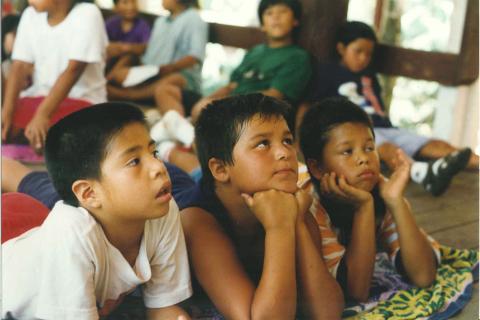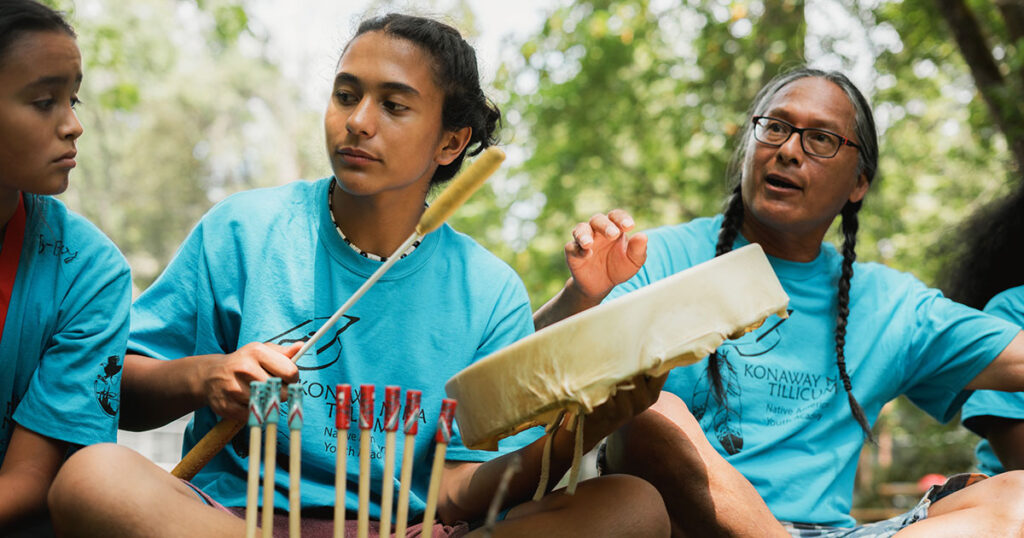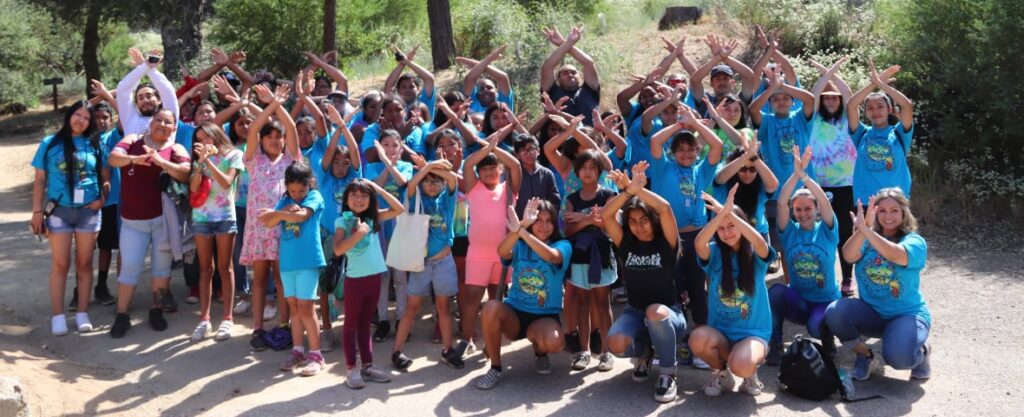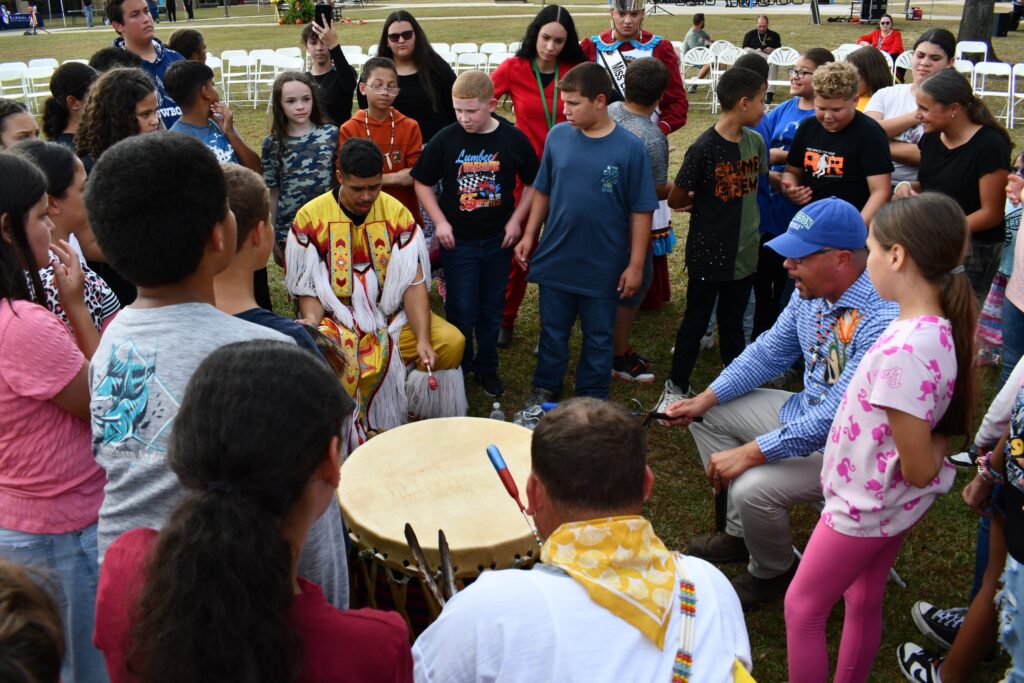Welcome to Episode 125 of Ramping Up your English!




Just as I welcomed students to my classroom for years as a public school teacher, I welcome viewers to this episode. Over 10 tens retired now, I continue to support English Learners through this TV/Internet-supported program.
Given my background in education, it’s not surprising that I take a deep interest in the topic of this lesson. When it comes to Native Americans – our thematic content unit – education has a complicated and tragic history. Yet it also has some bright spots in today’s world, and a hopeful future. I hope this episode informs and inspires our viewers.
Watching Episode 125
Episode 125 is available on archive.org. Click here to watch Ramping Up your English Episode 125: Education as seen on RVTV in Ashland, Oregon. This is free streaming with no ads.
Episode 125 Summary
In my opening comments, I shared that I had a career in education as a publuc School teacher in Southern Oregon. Indeed, it’s from my experience and passion for education that I produce TV programs such as Ramping Up your English and maintain this website.
Notwithstanding my rewarding career in education, education for Native Americans has its complexities and even tragic legacies. While critical education and instruction was passed down for millennia through traditional storytellers, European modeled education was alien to Tribal people. The worst part was the abuse that so many suffered in mandatory schooling – known as Indian Schools. Native Americans were forced to give over their children to schools often located far from their homes.
Interior Secretary Deb Haaland and SOU Native American Studies Chair Brook Colley relate to viewers the many levels of abuse suffered by the Indian Schools, resulting in trauma that continues to this day and death for some children. Secretary Haaland shares her insights from hours of listening to people sharing that trauma and the steps her agency is taking to foster healing.
Brook Colley and several of her students share the ups and downs of being Native Americans in higher education, as well as experiences earlier in life in educational settings. Oregon’s Senate Bill 13 is discussed as Oregon’s attempt to give Tribes more of a say in how Native American issues are taught in public schools. Comments come from Adventures In Education.
The episode ends on a hopeful note as we discover positive educational experiences being taught in Native culture camps and reviving instruction in Native Languages. Viewers also learn about Konaway Nika Tillicum Academy at Southern Oregon University – an academic program that encourages Native Youth to pursue higher education. These segments come from Life Passages: The Soul’s Journey hosted by producer Nancy Bloom.
Videos Featured in Episode 125
The long-form video for this episode on archive.org can be seen by clicking here.
For a version edited to fit in our time slot, Click here.
Videos Used in This Episode
Segments from an interview with SOU Native American Studies Chair Brook Colley were used throughout this episode. Click here to see the full interview on Adventures in Education from 2018.
Interior Secretary Deb Haaland launched an initiative to investigate Indian Boarding Schools. Click here to see the entire video from PBS News.
We included part of an interview with Secretary Haaland on the PBS News Hour. Click here to see the whole story. Visit PBS.org for more, and learn about their 2025 Defunded but not Defeated drive.
Viewers saw a segment of the Grand Ronde Tribal Lifeways Documentary. Click here to see the entire documentary.
The importance of restoring Native Languages was addressed in this episode. Click here to see the video Standing Strong: The Tribal Nations of Western Oregon.
Viewers heard from four students in SOU’s Native American Studies Program, along with department chair Brook Colley. Click here to view part one of the interview on Adventures in Education. Click here to see part two.
The PBS system’s Montana Experience produced an episode entitled Why Save a Language? It’s another excellent episode from that state’s Public TV. We used segments from this production, segments that contributed greatly to our own episode of Ramping Up your English. Click here to see this Montana Experience production.
Restoring Native Languages was further explored in the video Tolowa Dee Ni Speaking Across Generations. Click here to watch this moving story of teaching children how to speak their native language.
One of the best culture camp videos I found was from the Guilford School District. Segments from this video were used to share with viewers the positive impact of culture camps on students. Click Here to watch the whole video.
I used two episodes of Nancy Bloom‘s Life Passages: The Soul’s Journey for the segment on Konaway Nika Tillicum Academy – an academic summer program at Southern Oregon University in Ashland. Click here for her interview of David West. Click here for part two of Empowering Native Youth, an interview with Konaway Nika Tillicum director Brent Florendo.
Check For Comprehension
Episode 125 is packed with video clips from numerous sources. Below are a few questions to see how well you did with understanding this episode.
- List some of the problems that occurred during the Indian Boarding school era.
- Characterize that experience for the children and their families.
- List some of the challenges explained by Secretary Haaland in healing the trauma suffered by Indian Boarding School children and their families.
- Describe ways that Native Americans are passing down their culture and language to newer generations.
- List some challenges faced by Native American Students in Higher Education (universities).
- List some advantages to Native American students in Native American Studies programs.
- Explain what Oregon Senate Bill 13 does and how this provides benefits to Native American students as well as those who are not Native American.
- Describe how Konaway Nika Tillicum Academy engages Native American youth and how this empowers them.
You may need to watch this episode more than once to respond to the above questions. Do the best you can, but don’t worry if you can’t answer them all. There’s a lot of information here, and it comes pretty rapidly.
Personal Note
It’s in the purview of this program to explore how the new administration is affecting Native Americans. Click here for a report on this topic from Douchevella TV.
I share some of my own thoughts below:
I’m sorry to note that conditions in the United States have gotten worse. The Immigration and Customs agents (ICE) are being weaponized against Americans who don’t look “white” enough or who speak another language or who speak English with difficulty. Our own citizens have been arrested, thrown in detention centers with no communication with their families. Latinos and Native Americans have both been swept up in these raids.
Only a small minority are involved in criminal activity, while most are workers supporting their families and contributing to their communities. Hence, neighborhoods are standing up against these raids. There’s little relief in sight, since Texas is redistricting to disenfranchise Democratic voters, and action some other states may do if they get by with it.
Information is under attack, with the defunding of the Corporation for Public Broadcasting and lawsuits against “the legacy media.” Even Voice of America has been silenced. Public TV and radio are left without key funding that has heretofore been supported by Congress members of both parties. These are dark times indeed!
PBS is hoping to raise enough money from viewers and supporter through their “Defunded But Not Defeated” campaign. Visit PBS.org if you want to help. Furthermore, public radio is asking for donations at NPR.org. For support of Public media in Southern Oregon, you can visit Jefferson Public Radio at ijpr.org. For KSYS in Medford, visit Southern Oregon Public TV at SOPBS.org. It’s a step in regaining freedom of speech.
Our congressman voted against funding CPB, stating that his staff found a “liberal Bias.” So, I guess Antiques Road Show, Cooking With Lydia, Quilting shows, emergency alerts and travel shows are all left-wing programming from which we must be kept safe. Insanity reins in a fascist dictatorship.
Next Episode
Ramping Up your English Episode 126 is still being produced. Please check back soon.